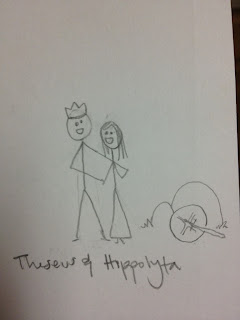As I keep reading Shakespeare more and more, my respect for him just grows so much! His talent is so impressive. I really love being able to read his plays for my class because it opens up his world to me. In high school I read the common plays that everyone is familiar with, like
Hamlet and
Romeo and Juliet. I think we read
Julius Caesar as well. But I had NO IDEA what a gold mine the rest of his works are! Right now I'm finishing off the gem
Love's Labour's Lost. To be honest, I don't know if I'd even heard of this play before my Shakespeare class but I love it!
Love's Labour's Lost is super witty and lively. It's so great! I really love Shakespeare's gift with working the language and it is super evident in this play with all the wordplay between the characters. For example, I find Ferdinand's receival of the ladies especially amusing. It just shows how Shakespeare was able to take something simple and make it dynamic.
FERDINAND
It shall suffice me; at which interview
All liberal reason I will yield unto.
Meantime receive such welcome at my hand
As honour without breach of honour may
Make tender of to thy true worthiness:
You may not come, fair princess, in my gates;
But here without you shall be so received
As you shall deem yourself lodged in my heart,
Though so denied fair harbour in my house.
Your own good thoughts excuse me, and farewell:
To-morrow shall we visit you again.
This part just gets me! It's so funny! Because he could have just said, "Well, you can't come in my kingdom. Have a good night and see you tomorrow." Which would have been more fitting considering that he's actually being pretty rude by not allowing them to come inside. After all, they've just traveled all the way there from their kingdom and he's not even giving them the hospitality of inviting them in. He makes them stay outside! But I love the irony of his language because it is so flowery and warm to contrast the situation. "As you shall deem yourself lodged in my heart..." Haha. How kind of him, the sweet king.
I think this double meaning stuff is something I might want to experiment with. Shakespeare wasn't the only one that loved wordplay and double meanings. I really love Latin people and as I've become more familiar with the Mexican culture, I've realized that they LOVE this type of stuff. They love when words say one thing and then have some hidden meaning behind it. (This passage of the play isn't quite the ideal example, but this thought just came to me). Anyway, in my Spanish class the other day, my teacher was showing us some Spanish wordplay. She showed us the word
inestable and it's definition
no estable (unstable) but how it can also mean
la mesa de Ines en norteamerica (Ines' table in North America). Haha :) Hm, it's not as good when you have to explain it, but the point is, wordplay is fun. Probably why it has the word play in it.



.jpg)











